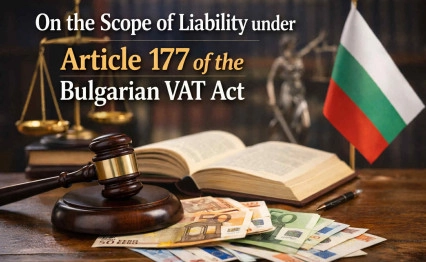
National Assembly introduced a 10-year absolute statute of limitation for the very first time in the Bulgarian Private law
National assembly introduced a 10-year long absolute statute of limitation for debts of natural persons, as a new Article 112 was added to the Obligations and Contracts Act. The new Article states that “With the expiration of a 10-year period, all monetary debts of natural persons shall expire regardless of its interruption except for cases where the performance of the obligation has been deferred or rescheduled.”
Eight exceptions to this rule are envisaged where this limitation period shall not apply, namely in terms of:
- the commercial activity of sole traders or natural persons – partners to Partnership under Art. 375 OCA.;
- tort;
- unjust enrichment;
- alimony;
- labour remuneration;
- compensations under the Labor code;
- privatisation transaction;
- property, restituted in accordance with the procedure set forth in a statutory instrument;
Article 115 of the Obligations and Contracts act shall apply as well. Therefore, the absolute statute of limitation shall not run:
- between children and parents for the time that the latter exercise parental rights;
- between persons under guardianship and their guardians as long as the guardianship lasts;
- between spouses;
- for claims of persons whose property is under trusteeship by law or by an order of a court, against the trustee as long as the trusteeship lasts;
- for claims for damages of legal entities against their managers as long as the latter are in office;
- for claims of minors and incapacitated persons for the period during which they have no legal representative or guardian appointed, and six months after such a person is appointed or after the legal incapacity is terminated;
- for the time of the duration of the court proceedings on the claim.
Moreover, the rule of Article 118, regarding the general statute of limitation, shall apply, as well, meaning that a debtor who has fulfilled his obligation after the expiration of the limitation, shall not be entitled to claim back what he had already given.
It is provided that these new rules shall apply to obligations which have not been fulfilled until the day of entry into force of the new rules, thus, in respect of them “the statute of limitation shall run from the day on which the debt becomes due. During pending enforcement proceedings, the limitation period shall run from the day on which the first enforcement action was taken, while if such proceedings have not been initiated – from the day on which the act confirming the debt has come into force.”
The vacatio legis provided is 6 months, i.e. the changes in the Obligation and Contract Act introducing the absolute statute of limitation for debts of natural persons shall come into legal force 6 months after their promulgation.


